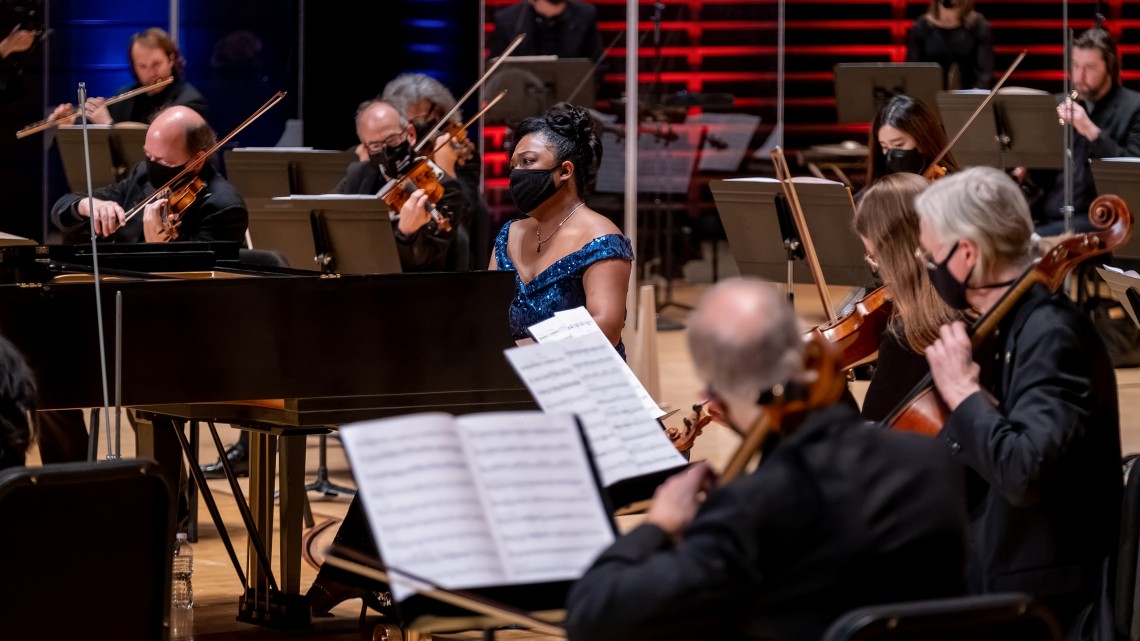
Pianist Michelle Cann playing Florence Price's Piano Concerto in One Movement with the Philadelphia Orchestra.
News directly from Cornell's colleges and centers
ONEcomposer partners with Philadelphia Orchestra for Florence Price premiere
By Kathy Hovis
As the Philadelphia Orchestra took the stage in January to record its digital performances for the spring season, a pair of Cornell faculty were there to witness history in the making as part of their new arts advocacy initiative: ONEcomposer.
Housed in Cornell’s Department of Music, ONEcomposer celebrates musicians whose contributions have been historically erased, and its inaugural season is devoted to American composer Florence Price (1887-1953).
“Piano Concerto in One Movement” was a piece Price held in particularly high regard, often sending it to conductors as an example of her best work. Last year, ONEcomposer had secured funding for an on-campus performance of this work featuring pianist Michelle Cann, the newly appointed Eleanor Sokoloff Chair of Piano Studies at the Curtis Institute. But when the COVID pandemic struck, ONEcomposer co-founders Tamara Acosta, visiting lecturer of voice at Cornell and assistant professor of voice at Ithaca College, and Stephen Spinelli, Cornell’s assistant director of choral programs, reimagined the possibilities.
They started by considering the dream scenario: a performance with the Philadelphia Orchestra. Philadelphia had programmed Price’s Symphony in E minor for a November broadcast, so Acosta and Spinelli wrote a proposal to the orchestra. They sought endorsements from connections within the music world, crossed their fingers and waited for a response from Philadelphia. Three weeks later, the proposal was accepted and the planning began.
Until very recently, the concerto’s original manuscripts were presumed lost, with only a two-piano manuscript and a few extant orchestral parts intact. So, in 2011, composer Trevor Weston was commissioned to create an arrangement of the concerto based on his knowledge of Price’s symphonic writing, and using surviving materials.
However, in the fall of 2019, a manuscript of the original orchestration was purchased at auction.
The arrival of this original meant that ONEcomposer’s collaboration with the Philadelphia Orchestra would yield the first North American performance of the original orchestration of the work since the 1930s. To ensure a successful product, Spinelli and Acosta worked closely with the orchestra’s librarian to examine source materials and cross-reference the new edition against Weston’s work, which Cann had been performing with orchestras around the country in recent years.
Finally, they were on their way to Philadelphia to witness the recording session, made all the more momentous because Price had made numerous attempts in her own lifetime to secure an East Coast premiere of the concerto, but never succeeded. Given how hard Price fought for this very opportunity, it was a humbling moment to see her work come to fruition, they said.
“We have been in love with this piece for a long time, and within just a few minutes of rehearsal, it was clear that the entire room had fallen in love with it, as well,” Spinelli said. “There is an energy present in musical performances that are fed by players’ honest passion, and that is what we heard coming from the stage.”
For both Spinelli and Acosta, the experience was affirmation of the importance of diverse voices in the musical conversation.
“Having the best musicians in the country perform Price’s music reveals new dimensions of its excellence,” Acosta said. “It is so important that the music we celebrate is reflective of the human experience and all of its diversity.”
Price’s “Piano Concerto in One Movement,” conducted by Yannick Nézet-Séguin, and featuring pianist Michelle Cann, can be heard on the Philadelphia Orchestra’s Digital Stage from Feb. 18-25. As part of this partnership ONEcomposer has been granted the opportunity to share a free performance on Friday, Feb. 19 at 5 p.m. EST. To attend and share in the experience, register here.
This opportunity was made possible through support from the Society for the Humanities’ Rural Black Lives initiative and the Central New York Humanities Corridor.
Media Contact
Get Cornell news delivered right to your inbox.
Subscribe
